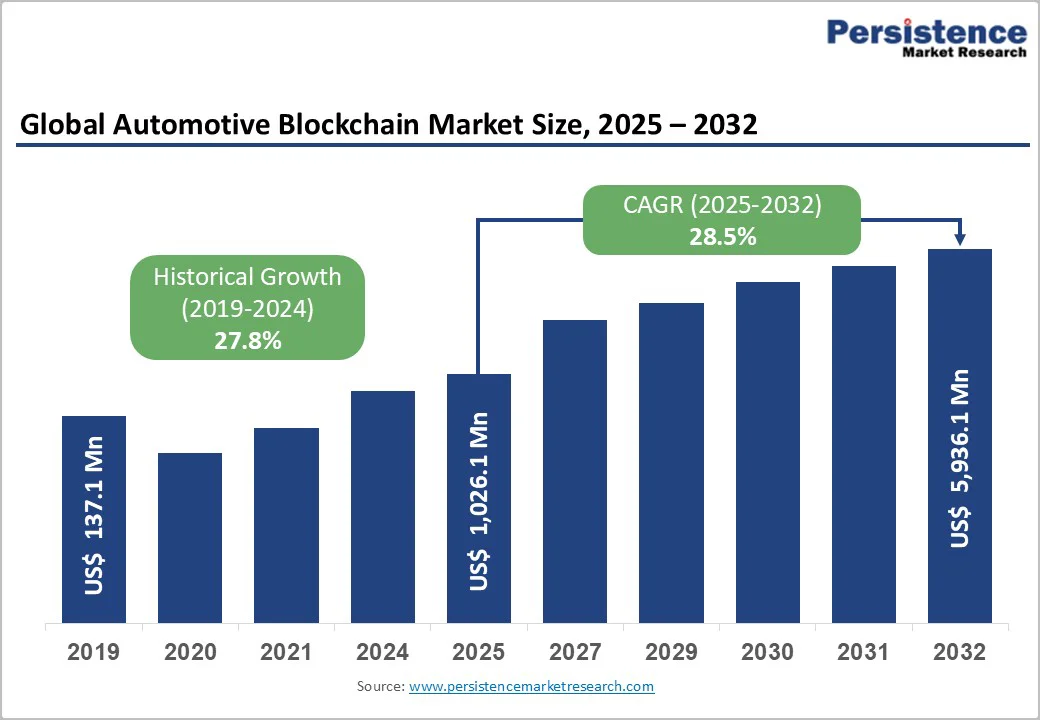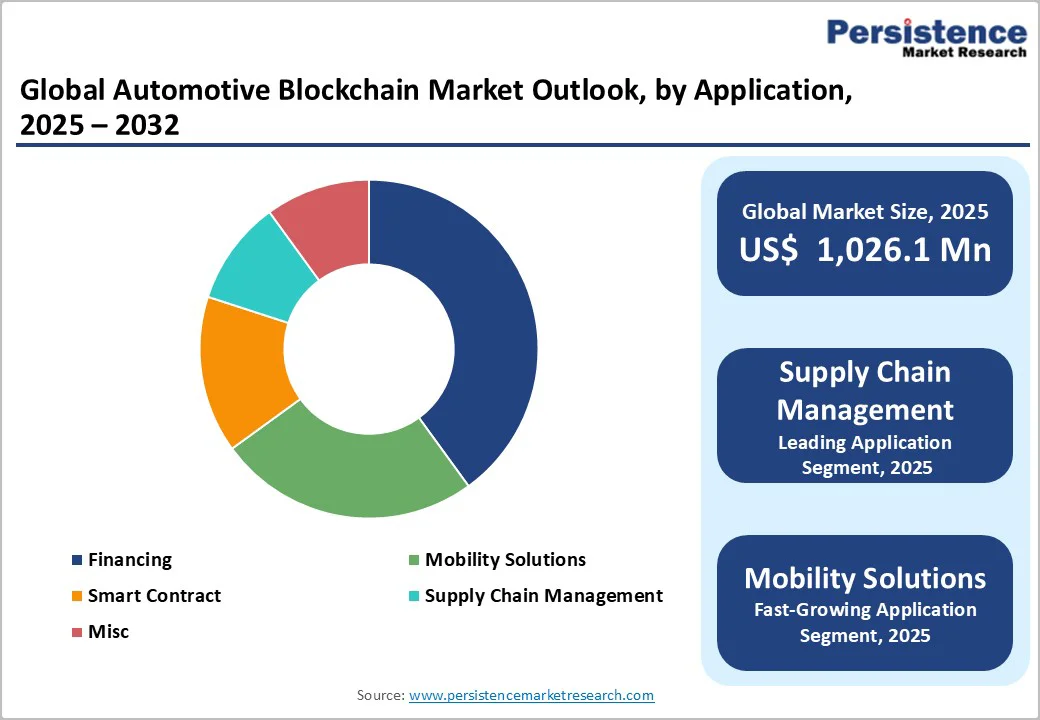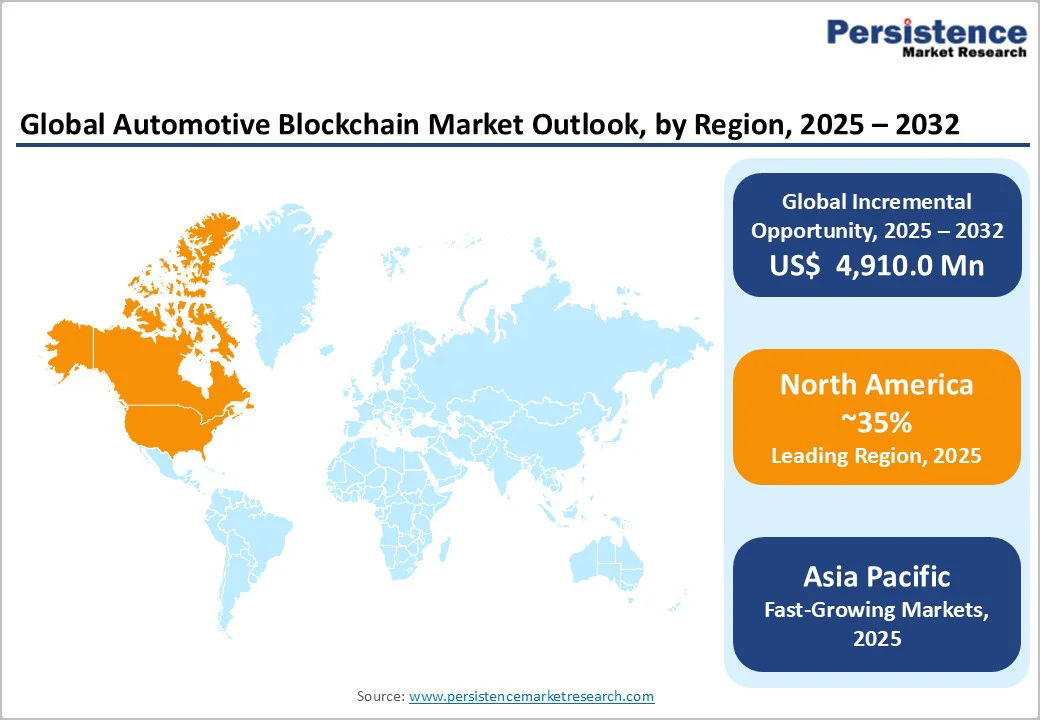ID: PMRREP33604| 197 Pages | 10 Dec 2025 | Format: PDF, Excel, PPT* | Automotive & Transportation

The global automotive blockchain market size is valued at US$ 1,026.1 million in 2025 and is projected to reach US$ 5,936.1 million by 2032, growing at a CAGR of 28.5% between 2025 and 2032.
The automotive blockchain market is poised for growth driven by several key factors. Firstly, the increasing demand for transparent and secure data management in the automotive supply chain propels the adoption of blockchain technology.
Secondly, the rise of electric and autonomous vehicles creates opportunities for blockchain applications in managing complex data transactions and securing communication networks.
| Key Insights | Details |
|---|---|
| Automotive Blockchain Market Size (2025E) | US$ 1,026.1 Mn |
| Market Value Forecast (2032F) | US$ 5,936.1 Mn |
| Projected Growth (CAGR 2025 to 2032) | 28.5% |
| Historical Market Growth (CAGR 2019 to 2024) | 27.8% |

A key driver propelling the automotive blockchain market is the escalating need for enhanced supply chain transparency within the automotive industry. As the sector becomes more complex with globalized supply chains, ensuring the authenticity and traceability of automotive components is paramount. Blockchain technology provides a decentralized and immutable ledger, enabling real-time tracking of parts and materials from manufacturing to assembly.
This transparency minimizes the risk of counterfeit parts, improves quality control, and enhances overall supply chain efficiency. The demand for greater visibility and accountability in the supply chain is driving the adoption of blockchain solutions, positioning it as a key driver in the automotive blockchain market.
In addition, the increasing adoption of electric vehicles (EVs) and the advent of autonomous driving technologies represent another crucial driver for the automotive blockchain market. The complexity of these technologies requires a robust and secure system for data management, communication, and transaction processing.
Blockchain, with its decentralized and tamper-resistant nature, addresses the security and transparency requirements essential for managing data generated by EVs and autonomous vehicles.
From secure and transparent charging transactions to ensuring the integrity of data in autonomous vehicle communication networks, blockchain technology is becoming integral to the infrastructure supporting the evolution of the automotive industry. The growing prominence of EVs and autonomous driving is, therefore, a significant driver propelling the expansion of the Automotive Blockchain market.
A key restraint impacting the automotive blockchain market is the complexity associated with integrating blockchain technology into existing automotive systems and processes. The traditional automotive industry operates on legacy systems, and the integration of blockchain requires a significant overhaul of these structures.
Implementing blockchain effectively involves connecting various stakeholders, from manufacturers to suppliers and dealers, in a decentralized and secure network. This complexity poses challenges in terms of adapting existing infrastructure, ensuring interoperability with legacy systems, and addressing concerns related to data migration.
The intricacies of integrating blockchain solutions may result in resistance from established industry players and hinder the widespread adoption of this transformative technology. Overcoming these integration challenges will be crucial for unlocking the full potential of blockchain in the Automotive Blockchain market, ensuring a seamless transition to decentralized and transparent processes across the automotive ecosystem.
A significant challenge facing the automotive blockchain market is the presence of regulatory uncertainties and standardization challenges. As the adoption of blockchain technology accelerates within the automotive industry, varying regulatory frameworks across different regions pose a hurdle. The absence of a standardized regulatory approach can lead to confusion and hinder the seamless integration of blockchain solutions.
Additionally, the lack of standardized protocols for blockchain implementation within the automotive sector introduces complexities in achieving interoperability among diverse systems. Establishing a harmonized regulatory landscape and industry-wide standards is crucial for ensuring a consistent and compliant application of blockchain technology.
Addressing these regulatory uncertainties and standardization challenges is paramount to unlocking the full potential of blockchain in the automotive blockchain market, fostering widespread adoption, and realizing the benefits of increased transparency and efficiency across the automotive ecosystem.
Integration of these systems with emergent technologies such as Artificial Intelligence (AI), and one key opportunity steering the automotive blockchain market is the heightened emphasis on enhanced data security and privacy concerns within the automotive industry. With the increasing digitalization of automotive processes, from connected vehicles to autonomous systems, the volume of sensitive data generated is substantial.
Blockchain, as a decentralized and tamper-resistant ledger, provides a robust solution to safeguard this data. By encrypting and securing information at every transaction point, blockchain technology significantly reduces the vulnerability of critical data to cyber threats. The growing awareness and regulatory focus on data privacy and security drive the adoption of blockchain solutions, positioning it as a key driver in the Automotive Blockchain market.
Moreover, another significant driver propelling the automotive blockchain market is the pursuit of efficiency gains in the automotive supply chain. Blockchain technology offers a decentralized and transparent platform that facilitates secure and real-time tracking of components and materials across the entire supply chain. This transparency minimizes errors, reduces delays, and enhances overall efficiency in processes such as procurement, manufacturing, and distribution.
As the automotive industry seeks ways to streamline operations and reduce costs, the adoption of blockchain solutions becomes instrumental in achieving these efficiency gains. The need for a more agile and responsive supply chain, coupled with a focus on cost optimization, positions blockchain as a transformative driver in the automotive blockchain market, impacting the industry's dynamics positively.
The dominant category is undeniably application & solution providers. These entities hold a dominant position due to their expertise in delivering tailored blockchain solutions that precisely address the complexities within the automotive sector. Application & solution providers play a crucial role in integrating blockchain technology seamlessly into various automotive processes, including supply chain management and secure data sharing.
Additionally, the fastest-growing category in the automotive blockchain market is represented by infrastructure & protocol providers. This category experiences rapid growth due to its foundational role in laying the groundwork for blockchain implementation. Infrastructure & protocol providers offer the fundamental frameworks and protocols necessary for the seamless integration of blockchain technology across automotive processes.
As the demand for blockchain solutions surges, these providers become essential for establishing the underlying infrastructure that supports secure transactions, data management, and communication within the automotive ecosystem.
The dominant category is commercial mobility. The complexity of supply chains in commercial mobility, including logistics, fleet management, and regulatory compliance, necessitates robust and transparent solutions provided by blockchain technology. Commercial mobility relies heavily on secure and efficient data management for tracking vehicles, managing cargo, and ensuring compliance with diverse regulatory frameworks.
Additionally, the fastest-growing category in the automotive blockchain market is shared mobility. The rising integration of blockchain with emerging technologies, such as ride-sharing platforms and autonomous vehicles, fuels the rapid growth of shared mobility solutions. Blockchain enhances the security, transparency, and efficiency of transactions within shared mobility ecosystems, contributing to the category's fast-paced expansion.
Supply chain management is dominant. Supply chain management applications in the automotive sector leverage blockchain to enhance transparency, traceability, and efficiency across the entire supply chain-from component manufacturing to assembly lines.
The fastest-growing category in the automotive blockchain market is smart contracts. The automation capabilities and efficiency gains offered by smart contracts contribute to their rapid growth. Automotive applications of smart contracts streamline complex transactions, such as vehicle sales, leases, and maintenance agreements.
These self-executing contracts enhance operational efficiency, reduce the need for intermediaries, and ensure transparency in contractual agreements.

North America generates approximately US$372 million market value in 2025 representing 36% global market share growing at 26.2% CAGR through 2032, driven by advanced automotive technology ecosystem, regulatory innovation leadership, and vehicle financing market dominance.
The United States dominates regional market with 79% North American share through Ford, General Motors, and Tesla blockchain initiatives, MOBI consortium leadership, and California DMV blockchain pilot digitizing 42 million vehicle titles.
U.S. vehicle financing market representing $1 trillion annual origination creates compelling smart contract opportunity with blockchain reducing transaction costs justifying rapid adoption. Regulatory innovation through California DMV blockchain title transfer establishes precedent supporting national adoption momentum.
Europe is emerging as a dominating region in the automotive blockchain market due to its strong emphasis on technological advancements and robust regulatory support. European countries have been at the forefront of fostering innovation in the automotive sector, particularly in adopting and integrating emerging technologies.
The region's commitment to advancing digitalization aligns well with the transformative potential of blockchain in enhancing transparency, security, and efficiency within the automotive industry.
Moreover, European governments and regulatory bodies have been proactive in providing a conducive regulatory environment for the adoption of blockchain technology, creating a supportive ecosystem for businesses to explore and implement blockchain solutions in automotive applications.
South Asia, and Oceania present significant opportunities for manufacturers in the automotive blockchain market, primarily driven by the region's status as emerging automotive markets. The growing demand for vehicles in these regions, fueled by rising disposable incomes, urbanization, and a burgeoning middle class, creates a fertile ground for the adoption of innovative technologies like blockchain.
Manufacturers in these regional pockets are all set to establish a strong presence in these markets by offering blockchain solutions that cater to the specific needs of the burgeoning automotive industry. As South Asia, and Oceania experience an uptick in vehicle sales and production, manufacturers can capitalize on this growth by integrating blockchain technology into various automotive processes, enhancing transparency, and gaining a competitive edge.

Prominent organizations, including IBM Corporation, Accenture, R3, ConsenSys, are at the vanguard of this sector, Competitive intelligence in the Automotive Blockchain market plays a pivotal role in navigating the dynamic landscape shaped by technological advancements and evolving industry demands.
Companies engage in rigorous analysis of key competitors, tracking their market share, product portfolios, and strategic initiatives within the blockchain space. This intelligence enables businesses to anticipate market trends, stay abreast of emerging technologies, and identify areas of differentiation.
Insights into competitors' strengths and weaknesses provide a foundation for informed decision-making, guiding companies to position their blockchain offerings effectively. The rapidly evolving nature of the Automotive Blockchain market necessitates a continuous and adaptive approach to competitive intelligence, ensuring that businesses remain agile in responding to market shifts and capitalize on emerging opportunities.
The Automotive Blockchain market is estimated to be valued at US$ 1,026.1 Mn in 2025.
The key demand driver for the Automotive Blockchain market is the rising need for secure, transparent, and tamper-proof data exchange across increasingly digital automotive ecosystems.
In 2025, the North America region will dominate the market with an exceeding 35% revenue share in the global Automotive Blockchain market.
Among the Application, Supply Chain Management holds the highest preference, capturing beyond 33% of the market revenue share in 2025, surpassing other Application type.
The key players in Automotive Blockchain are IBM Corporation, Accenture, ConsenSys, and XAIN AG.
| Report Attribute | Details |
|---|---|
| Historical Data/Actuals | 2019 - 2024 |
| Forecast Period | 2025 - 2032 |
| Market Analysis Units | Value: US$ Mn, Volume: Units |
| Geographical Coverage |
|
| Segmental Coverage |
|
| Competitive Analysis |
|
| Report Highlights |
|
By Provider
By Mobility
By Application
By Region
Delivery Timelines
For more information on this report and its delivery timelines please get in touch with our sales team.
About Author